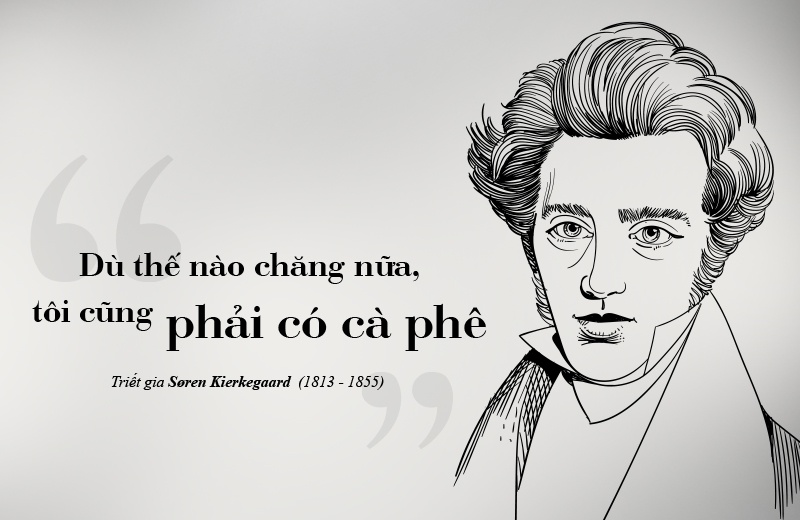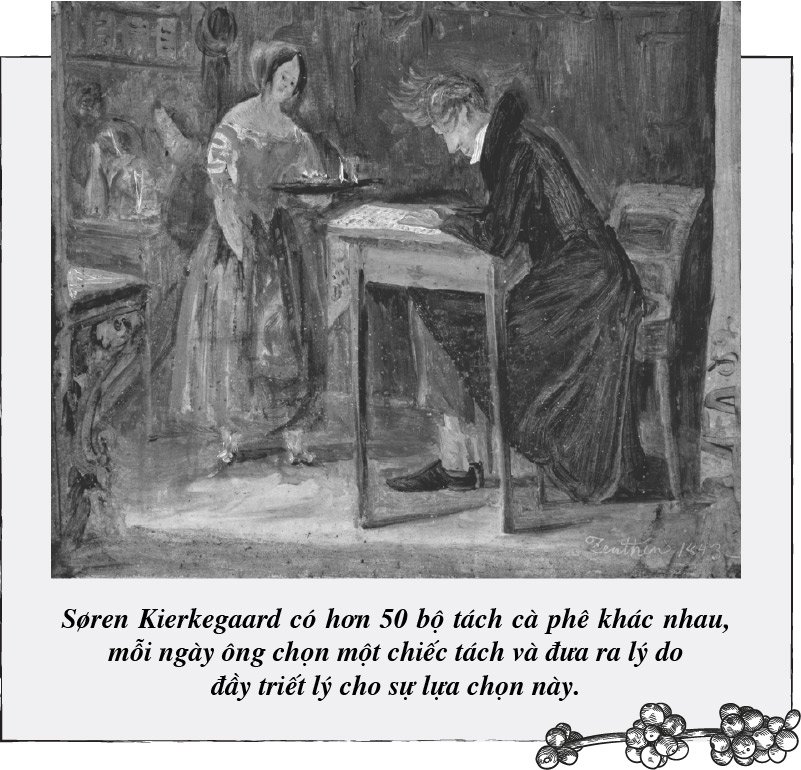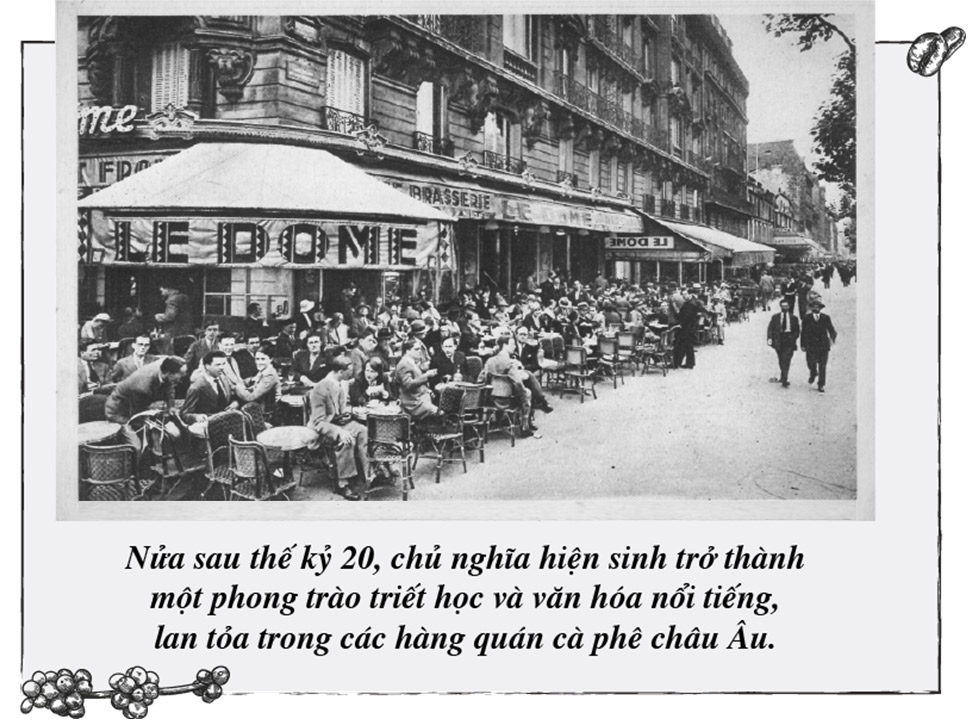Article 76: Søren Kierkegaard – philosophy over a cup of coffee
Søren Kierkegaard was one of the most influential thinkers of the 19th century. Brewing his own cup of coffee, he diligently searched for the meaning of human existence to live fully with himself.

“Either way, I have to have coffee.” – Søren Kierkegaard (1813 – 1855)
Are we living up to our own desires or living up to the standards of others? Do we exist in the present or live with the torment of the past and the fear of planning the future? After all, being born as a human is doing what it takes to perfectly fulfill our own role and live a meaningful, happy life.
Choosing our own lifestyle
In the 19th century, advances in science and technology gave rise to new directions in philosophical thinking. Philosophers raised many questions about the existence of man in a particular world and society. Man as a special existence is the intersection of two worlds – the spiritual world and the natural world, so it is necessary to consider man deeply not only as existence, but also as the study of existence through intrinsic forces other than reason. The concern of this age was what people needed to think and do to become “Human” in the true sense.
.

“What the age needs is not a genius — it has had geniuses enough. What the age needs is awakening.” – Søren Kierkegaard
Danish philosopher Søren Kierkegaard (1813-1855) was an important figure creating a turning point in the development of European philosophy, he was honored as the father of Existentialism. Kierkegaard took man in an existential situation as the starting point of all his philosophical thinking. He held that each individual person, not society or religion, was responsible for creating meaning for his or her own life to live it fully and authentically.
Human life is an existence with twists and turns, joy – sadness, pleasure – suffering, success – failure, happiness – boredom… man must face the world as an individual. In order to be himself, to have dignity, to have an authentical cause to live, man must engage in the depths of life and experience his condition in this diverse world, thereby choosing a way of existence that suits his own identity.
Kierkegaard himself lived an eventful life. Kierkegaard was intelligent and creative but was always weighed down by anxiety and melancholy because of his family background. His father was a wealthy merchant but always haunted the thought of punishment from God for the sin of cursing God’s name. Kierkegaard was taught by his father piety and the belief that God does not forgive the sins that people have committed. To please his father, despite his love of philosophy, Kierkegaard chose to study theology at the University of Copenhagen. In the early years, Kierkegaard did not pay attention to his studies but threw himself into a rebellious and loose life. After the death of his father in 1838, he seriously invested all his energy in his studies and completed his doctoral thesis in 1841, when he was 28 years old.
In the same year, Kierkegaard annulled his marriage with the person he loved so much and chose a single life because he felt that he could not build happiness through the marriage path between two souls with too many differences. Through personal painful experiences, he pondered more about human life and thought more deeply about lifestyle choices.
Waking up and committing
Kierkegaard considered guilt, anxiety, and despair to be the fundamental factors that shaped people’s spiritual and moral dispositions. Because that was the darkness that covered most of his life. He realized that he needed to shoulder the mission to find the way to liberation by recognizing the terrible power inside each person.

Søren Kierkegaard owned more than 50 different sets of coffee cups, he chose one every day and gave a philosophical rationale for his choice.
Søren Kierkegaard was like a melancholy man trying to understand and answer questions about life. He was determined to understand himself before knowing anything else outside. Søren Kierkegaard’s day was dominated by three things, following a particular lifestyle: writing, going for a walk, and drinking a lot of coffee. Kierkegaard had a rather strange way of enjoying coffee. He poured sugar into the coffee cup until it was taller than the top. He then added super strong black coffee, slowly dissolved the sugar tower and finished his cup. Kierkegaard owned at least 50 sets of cups and saucers, but only one cup and one saucer per set. Before making coffee, his secretary had to choose which cup and saucer he liked that day, and then explained this choice to Kierkegaard as a ritual or a philosophical meaning. As theologian Joakim Garff at the Søren Kierkegaard Research Center wrote, coffee was like Kierkegaard’s brain stimulant, which was active throughout the day and into the night so that he could mindfully think and write. Even when his fingers were exhausted, Kierkegaard still firmly grasped the slender handle of the coffee cup to drink to the last drop.
Kierkegaard wrote and published most of his major works between 1843 and 1846. He placed man between two situations: what is now, and what is essential. People always feel their insecurity and finiteness, which causes them to become corrupted, frustrated, worse and worse. However, corruption also creates an impetus for people to restore their ego. The movement of the ego is to go from one plane of existence to another by the act of will and choice. Understandably, the existential person is thrown into the world with many limitations and constraints, sometimes engulfed in a state of crisis and tension, but it also motivates him or her to find the meaning of life, so as to live a full life, and not to live just for the sake of living.
Kierkegaard strongly advocated the commitment of individuals on the path to the search for truth. Executing the mission of becoming one’s own self requires commitment, a committed person can reach true existence, not stopping at lofty ideals or good intentions. Kierkegaard wrote continuously and left a legacy of works of great value such as: Fear and Trembling (1843), Repetition (1843), Philosophical Fragments (1844), Stages on Life’s Way (1845)…

In the latter half of the 20th century, existentialism became a popular philosophical and cultural movement, pervading European cafes.
His ideas spread widely in the years after the Second World War, when people were falling into a crisis of belief, doubting reality and longing for liberation by a new way of life. Existential philosophy was closely associated with coffee shops on the left bank of the Seine (Paris, France) with typical representatives such as philosophers Jean-Paul Sartre, Simone de Beauvoir, Albert Camus… Besides philosophy, Existentialism philosophy strongly influenced many other fields such as theology, drama, art, literature, and psychology.
The image of man in the existential world evoked thoughts and concerns about the sense of responsibility, the role of a human being, and the choice of attitude to life as well as the act of engaging self for others. From there, it brought people back to the source of human existence. In parallel with that process, the image of coffee – a drink with the function of “awakening and creativity” opened up visions and feelings in order to achieve a clear purpose of the life of a true human being, enabling each person to master his or her own obsessions and desires to fully engage in discovering and creating meaning in life.
THE REAL COFFEE
ROASTED ONLY FOR PEOPLE OF WISDOM!
Source: “The Philosophical Way of Coffee” – copyright by Trung Nguyen Legend


